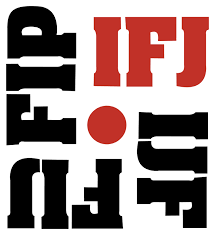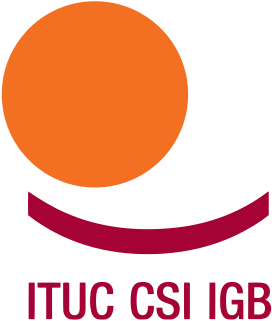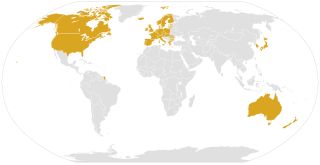
Global Unions or Council of Global Unions is a website, which is jointly owned and managed by the International Trade Union Confederation (ITUC), the Trade Union Advisory Committee to the OECD, and ten global union federations (GUFs).

Global Unions or Council of Global Unions is a website, which is jointly owned and managed by the International Trade Union Confederation (ITUC), the Trade Union Advisory Committee to the OECD, and ten global union federations (GUFs).
In November 2006, two international union organizations were created, the ITUC and the Council of Global Unions that emerged from a reorganization of the international trade union movement (which was divided because of post-war divisions). ITUC is the result of the breakup of both the WCL and ICFTU for the purposes of uniting under one organisation. The Council of Global Unions was created at the first meeting of ITUC and is a body involving the global union federations which represent their respective sectors at the international trade union level, ITUC, and the Trade Union Advisory Committee to the OECD. [1]
The Council of Global Unions (CGU) held its inaugural meeting in Brussels, 9–10 January 2007. All GUFs, with the exception of the International Metalworkers' Federation,[ citation needed ] as well as TUAC, became members of the Council and signed the agreement.
The CGU was created to encourage closer co-operation among global unions in order to act more effectively at the international level to build a more favourable, enabling environment for organising and collective bargaining. Although its work has policy implications, it was not established to make policy. That is the responsibility of the organisations that constitute the CGU.
Although Global Unions are described as 'global', this represents more an "aspiration than a reality since they are more accurately described as international bodies with wide coverage that are 'globalising'". [2] Historically, they have built outwards from their European bases in an attempt to include unions in other regions and are still trying to extend their coverage to every country where unions are found.[ citation needed ]

The United Nations Economic and Social Council is one of the six principal organs of the United Nations, responsible for coordinating the economic and social fields of the organization, specifically in regards to the fifteen specialised agencies, the eight functional commissions and the five regional commissions under its jurisdiction.

The International Federation of Journalists (IFJ) is a global union federation of journalists' trade unions—the largest in the world. It represents more than 600 000 media workers from 187 organisations in 146 countries.

The World Confederation of Labour (WCL) was an international labour organization founded in 1920 and based in Europe. Totalitarian governments of the 1930s repressed the federation and imprisoned many of its leaders, limiting operations until the end of World War II. In 2006 it became part of the International Trade Union Confederation (ITUC), ending its existence as an independent organization.

Ken Georgetti is a Canadian labour leader and former President of the Canadian Labour Congress.
A global union federation (GUF) is an international federation of national trade unions organizing in specific industry sectors or occupational groups. Historically, such federations in the social democratic tradition described as international trade secretariats (ITS), while those in the Christian democratic tradition described themselves as international trade federations. Equivalent sectoral bodies linked to the World Federation of Trade Unions described themselves as Trade Union Internationals.
Education International (EI) is a global union federation (GUF) of teachers' trade unions consisting of 401 member organizations in 172 countries and territories that represents over 30 million education personnel from pre-school through university. This makes it the world's largest sectoral global union federation.

The International Federation of Building and Wood Workers (IFBWW) was a global union federation of trade unions in the building, building materials, wood, forestry and allied industries.
The ITUC Regional Organisation for Asia and Pacific is a regional organisation of the International Trade Union Confederation representing trade unions from countries in Asia and Oceania. It has 40 affiliated organisations in 28 countries, claiming a membership of 30 million people.

Decent work is employment that "respects the fundamental rights of the human person as well as the rights of workers in terms of conditions of work safety and remuneration. ... respect for the physical and mental integrity of the worker in the exercise of his/her employment."

The Trade Union Advisory Committee to the OECD (TUAC) is the interface of the Organisation for Economic Co-operation and Development (OECD) with organized labour. TUAC has 59 affiliated trade union centres in 31 OECD countries, representing more than 66 million workers. It also has associate members in Brazil, Indonesia, Russia and South Africa.
The Building and Wood Workers' International (BWI) is the global union federation of democratic and free trade unions in the building, building materials, wood, forestry and allied industries.
The OECD Guidelines for Multinational Enterprises are recommendations on responsible business conduct addressed by governments to multinational enterprises operating in or from the 49 adhering countries. The Guidelines provide non-binding principles and standards for responsible business conduct in a global context that are consistent with applicable laws and internationally recognised standards.

The International Trade Union Confederation is the world's largest trade union federation.

The Organisation for Economic Co-operation and Development's (OECD) Development Assistance Committee (DAC) is a forum to discuss issues surrounding aid, development and poverty reduction in developing countries. It describes itself as being the "venue and voice" of the world's major donor countries.

The Global Labour University (GLU) is an international network of universities, trade unions, NGOs and the International Labour Organisation. It was initiated in 2002 and offers masters programs, academic certificate programs and Massive Open Online Courses (MOOC) on sustainable development, social justice, international labour standards and trade/labour unions, economic policies and global institutions.

The Irish Trades Union Congress (ITUC) was a union federation covering the island of Ireland.

The Organisation for Economic Co-operation and Development is an intergovernmental economic organisation with 38 member countries, founded in 1961 to stimulate economic progress and world trade. It is a forum of countries describing themselves as committed to democracy and the market economy, providing a platform to compare policy experiences, seek answers to common problems, identify good practices and coordinate domestic and international policies of its members. Generally, OECD members are high-income economies with a very high Human Development Index (HDI) and are regarded as developed countries. As of 2017, the OECD member countries collectively comprised 62.2 % of global nominal GDP and 42.8 % of global GDP at purchasing power parity. The OECD is an official United Nations observer.

Henryka Teodora Bochniarz, Ph.D. is a Polish economist and administrator who is a former Minister of Industry and Trade in the Government of Poland.

The Global Apprenticeship Network (GAN) is a Swiss independent and neutral not-for-profit association based in Geneva. The GAN is a network of companies, employer organisations, associations and international organisations with the mission of promoting quality apprenticeships and the goal of creating job opportunities for youth and ensuring skills for business.